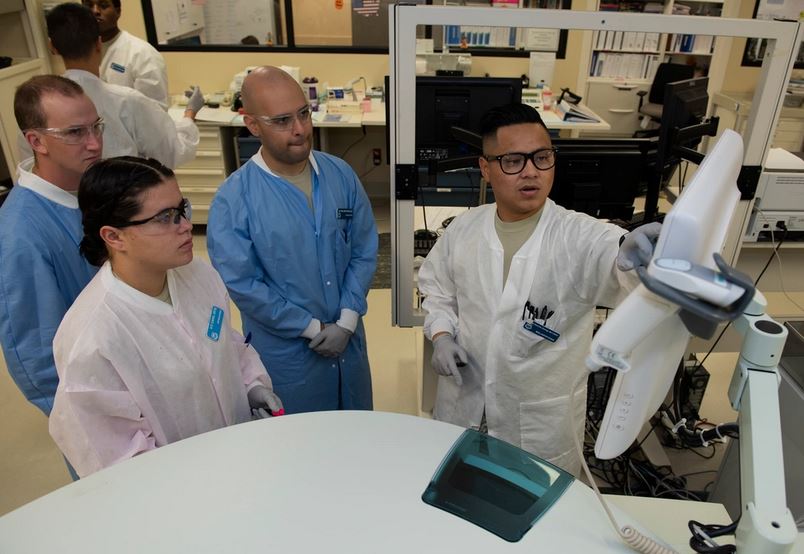Biomedical Laboratory Research Service (BLRS)

About
The mission of the Biomedical Laboratory Research Service (BLRS) is to educate and assist staff clinicians and learners in the conduct of translational, preclinical, and clinical research. The core laboratory is staffed by professional military and civilian scientists and serves as central facility for conducting basic research studies.
Facilities
The core laboratory occupies 5,200 ft2 within the Department of Clinical Investigation's footprint. BLRS has four cores (Cell Biology, Genomics, Microscopy, and Proteomics) in addition to General Lab and Biorepository support.
Personnel
BLRS is staffed with civilian research scientists, technicians, and support staff. The BLRS team provides scientific guidance in proposal development, feasibility assessment, scientific writing, and experimental execution.
Capabilities
BLRS provides scientific and technical expertise in various areas and disciplines. Its unique location within Madigan and state-of-art-instrumentation position the lab to provide a centralized location and space for conducting impactful research. BLRS provides the expertise to collect, process and store samples within minutes from the operating room, along with the necessary coordination between collections and care teams.
The Cell Biology Core is equipped with multiple biosafety level 2 cabinets, microscopes, benchtop flow cytometry, magnetic cell sorter, as well as all of the support equipment required for cell culture (e.g. water baths, centrifuges, autoclave, etc.).
The Genomic Core includes high-throughput sequencing platforms, RT-PCR, transcript profiling, and other equipment suited to transcriptomic and genomic studies. Both traditional and quantitative thermocyclers are available for sequence amplification and examination.
The Microscopy Core possess epifluorescence, confocal, laser dissection, and traditional light microscopes for analyses of histological and live tissue samples. Immunofluorescent and immunohistochemical sample labeling are routinely performed, with automated slide staining and preparation capabilities available.
The General Lab comprises numerous centrifuges, spectrophotometers, pH meters, plate readers, and other fundamental research tools. Histological capabilities include automated tissue preservation and sectioning using microtome and cryostat for paraffin embedded and frozen tissue blocks, respectively.
The Biorepository includes multiple freezers dedicated to storing human and animal samples. These samples are well curated and maintained, preserving important clinical metadata.
Scientific Review Committee
Scientific review of research proposals are required before an Institutional Review Board (IRB) can approve a human research study, ensuring regulatory criteria are met [IAW 45CFR46.111 (a) and 21CFR. 111(a)]. All non-exempt research proposals are submitted to the Scientific Review Committee (SRC) at Madigan prior to review by the Regional Health Command-Pacific (RHC-P) IRB. The SRC through an internal peer review process assesses the scientific quality and appropriateness of the study to the clinical and translational research goals and mission of the US Army Medical Department.
Protocol Development Workshop
The objective of the Protocol Development Workshop (PDW) is to assist Madigan and regional staff, learners, and collaborators with research idea development and proposal preparation through an advisory team approach. The participant completes an electronic copy of the PDW Study Worksheet, which contains sections on administrative, scientific, clinical, statistical, human subjects, and other information. These details enable the PDW advisory team to better understand the proposed research and guide the participant towards meeting their research goals. PDW advisory team members include clinical, research, regulatory, and administrative professionals.
Biomedical Research Short Course
The Biomedical Research Short Course targets staff and learners interested in conducting pre-clinical, translational, and/or clinical research. The four day in-residence course uses seminars and practical hands-on workshops, participants are educated on the conduct of human health and disease research emphasizing precision medicine initiatives within DoD health infrastructure. Practical experience in the application of molecular and cell biology, histology, genomics, and proteomics techniques are presented as a basis to examine clinical and military health relevant questions.
Biosafety Level 3 laboratory
Madigan Army Medical Center operates a Biosafety Level 3 (BSL-3) reference laboratory for the Center for Disease Control and Prevention's (CDC) Laboratory Response Network (LRN). The LRN is an international network of member laboratories that domestically provides the national security detection infrastructure and emergency testing capacity to respond to biological and chemical terrorism as well as other high priority public health emergencies. To facilitate this mission, member laboratories are provided (under the qualification agreement) with CDC-developed assay procedures, testing algorithms and specialized reagents to identify biological and chemical threat agents. Madigan's secure BSL-3 laboratory possesses the capability to perform conventional bacterial and viral culture, select bacterial biochemical assays, immunofluorescence, and polymerase chain reaction (PCR). It houses biosafety cabinets, a dead air hood, and traditional and multiplex PCR equipment with an autoclave and vaporous hydrogen peroxide for waste and rooms/equipment decontamination, respectively. The laboratory is authorized to possess, use, and transfer select agents and toxins under the provisions of the National Select Agent Registry (2013).